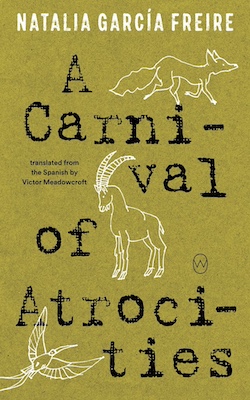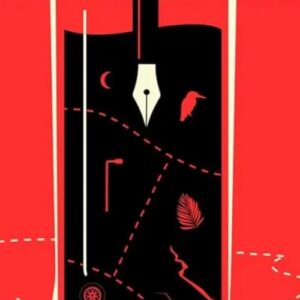
There was a time when I’d set out to be a magnificent boy. I looked at the world with the palms of my hands, understood the language of reliefs, the vibration of colors, the gravity of forms; this is how I discovered a world that was beautiful and simple, like the plowed fields that wind across hillsides and from a distance look like paintings. This is how I experienced the world, and I may even have loved it. I didn’t want it to end, which is why I went around with bandages over my eyes. I was seven years old and mamá could not stop laughing. She thought what I was doing was a game and didn’t scold me when I knocked over glasses and flowerpots, simply fetching the broom and sweeping up the pieces. At that time, I used to pray as well. I prayed to everything, to the oldest eucalyptus tree down by the river, to the best egg-laying hen, to mamá’s left breast, which was larger, and to an old cat that limped and seemed so all alone. But father had no patience with me, he just thrashed me. And I continued to search for a way to avoid seeing what I saw.
Of course, in the end, I gave up.
Maybe this was because what father said was true: I’m feebleminded. I removed the bandages and returned to my world of fury. There, instead of words, I saw a language composed of animal heads which bled and left red trails in their wake. If I looked up at the sky, the sun was always mid-explosion, and when I looked in a mirror, I could quite clearly see through my skull to a brain like a demented labyrinth in which burning men and headless women were always running about.
My eyes were Avernus, the entrance to the underworld.
I would always see Víctor as a mutilated child, with the bleeding heart of Christ and a serpent like the one from Eden slithering up his butt; mamá was a bichito, a creepy-crawly, dark and plump like a leach, and father was a man full of tumors and fat growths on his legs and cheeks that became even longer at his groin.
But not on that day. On the day father left, he looked different. He was no longer that elephant man with the innocent gaze of a child that drove me out of my mind. The day he vanished, his body looked immaculate to me, shiny, with perfect hands. It made you wish he would touch your brow and bless you.
Where are you going so early, father? I asked him that morning.
But he didn’t answer, merely stood before me, very close. My forehead grazed his chest and he began to howl. I felt a shiver run through me and wanted to ask what the hell was wrong with him, when he covered his ears as if something had ruptured deep inside him. Then he started babbling, and that’s how he left, with his hands over his ears, his pants falling down, ass half hanging out, and walking slowly, bathed in light. A blessed fool among the wilderness.
The old man did not return that day. Mamá was convinced he’d gone out drinking. He’ll be back, she proclaimed, with mussed-up hair and his suit all covered in aguardiente and filth. Yet I knew he wouldn’t. Although it’s true the old man would often leave without saying anything, returning drunk a few days later and going straight to bed, which mamá lined with black plastic bags in case he pissed in his sleep.
That day, however, there was something different and I knew it, I was sure the old man wasn’t coming back.
In the early hours of the morning, Mamá Bichito finally fell asleep, but Víctor said it wasn’t right to leave the old man out there for so long, wherever he was, no matter how drunk he might be. Víctor-Heart-of-Christ was always coming up with big ideas for saving the world, he wanted to save souls and wasn’t satisfied with the little pigeon souls in matchboxes I brought him as offerings, before which he would break down in tears. Víctor would never give in when it came to father, so we went out looking for him.
We left mamá snoring on the chair in the kitchen, which was filled with steam coming from an old pot where some turnips and carrots were simmering. Mamá Bichito slept and cooked all day and night and smelled of stale sleep and grime.
We took the old rifles father kept in the cellar—from the time when he used to run guns for grandfather— as well as a couple of black-spotted bananas, and set off in silence. For half the journey, I sat in the handcart while Víctor pulled, then we swapped over and I pulled as he stood scanning from side to side, hand at his brow like a sailor. It was just like the time we saw the wolf. The first impression you have when you see a wolf is good, something beautiful and gray is happening to you. It’s only later you realize that the wolf is coming for you. That’s how it was with the old man. In the beginning it was a real adventure.
Death is just like a pirate,
It eats tough meat and drinks salt water.
Death is just like a pirate,
It bares its ass, then goes for the slaughter.
This is what we sang on the way to the waterfall where Víctor believed the old man might have gone, because several times before we had found him teetering there, with his eyes closed, covered by the water, and been forced to drag him back to the house like a stuffed dummy I would have liked to watch burn on an enormous bonfire fed with ragweed and rue to chase away the old man’s evil spirit, the fleas and the flies. But no one wanted to hear my dirty plans, least of all Víctor, who loved the old man with a stupid love. So that’s where we were headed, once again, to look for him.
Before reaching the waterfall, we came to the forest of frailejones. Day was breaking, and as I stood there, submerged in the jubilance of the tussock grass, with the first rays of sunlight, I managed to get Víctor to forget about father for a minute.
That’s the Judases’ ranch, you’ll have to cross through there, said Víctor.
He said this with his hands at his waist and the grown-up voice of a cowboy, like when our games turned serious.
I’ve been this way before, bastard, I’m familiar with the Judases, I told him, they won’t let us through, they’d sooner kill us.
You’ll go for my cattle. Forget it.
That’s when I took one of the rifles from the handcart. It was rusted and grimy, but gripping it gave you an urge to do evil. Víctor came over and sent the gun flying with a kick. He grabbed the remaining rifle and the bang-bang of our brawl filled the entire forest and the morning, until we came together, gasping, face-to-face, dragging ourselves along like lizards, unsure exactly when the game had ended. We lay there in the grass, bruised and sweaty, allowing our weapons to fall.
And what if the old man doesn’t come back? asked Víctor.
It’ll be a kind of liberation, I told him, I know that Judas, one of these days he’ll end up killing us.
In the distance, we heard the barking of the dogs.
__________________________________
From A CARNIVAL OF ATROCITIES by Natalia García Freire. Used with the permission of the publisher, WORLD EDITIONS. Translation copyright © 2025 by Victor Meadowcraft.


